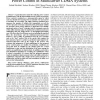Free Online Productivity Tools
i2Speak
i2Symbol
i2OCR
iTex2Img
iWeb2Print
iWeb2Shot
i2Type
iPdf2Split
iPdf2Merge
i2Bopomofo
i2Arabic
i2Style
i2Image
i2PDF
iLatex2Rtf
Sci2ools
105
click to vote
JSAC
2006
2006
A game-theoretic approach to energy-efficient power control in multicarrier CDMA systems
A game-theoretic model for studying power control in multicarrier code-division multiple-access systems is proposed. Power control is modeled as a noncooperative game in which each user decides how much power to transmit over each carrier to maximize its own utility. The utility function considered here measures the number of reliable bits transmitted over all the carriers per joule of energy consumed and is particularly suitable for networks where energy efficiency is important. The multidimensional nature of users' strategies and the nonquasi-concavity of the utility function make the multicarrier problem much more challenging than the single-carrier or throughput-based-utility case. It is shown that, for all linear receivers including the matched filter, the decorrelator, and the minimum-mean-square-error detector, a user's utility is maximized when the user transmits only on its "best" carrier. This is the carrier that requires the least amount of power to achie...
| Added | 13 Dec 2010 |
| Updated | 13 Dec 2010 |
| Type | Journal |
| Year | 2006 |
| Where | JSAC |
| Authors | Farhad Meshkati, Mung Chiang, H. Vincent Poor, Stuart C. Schwartz |
Comments (0)

